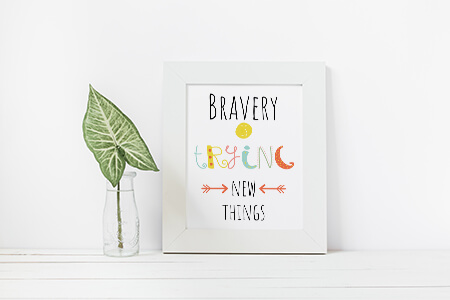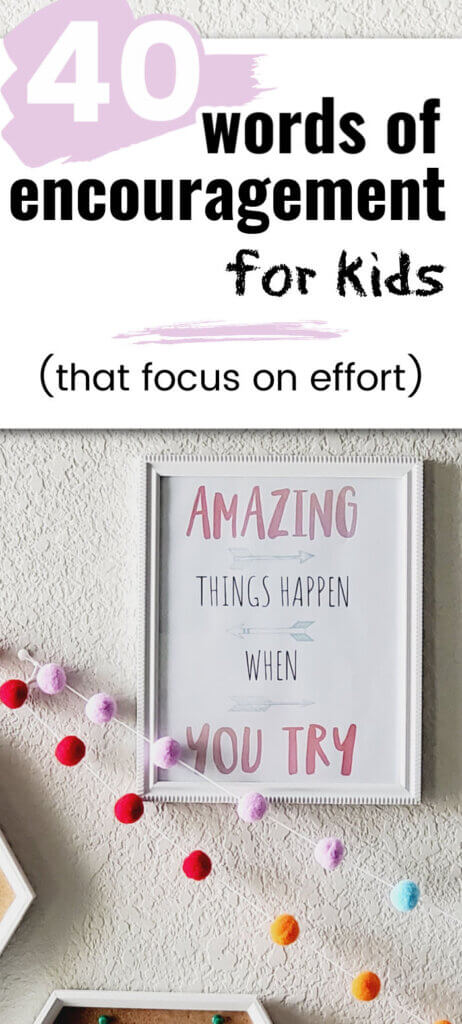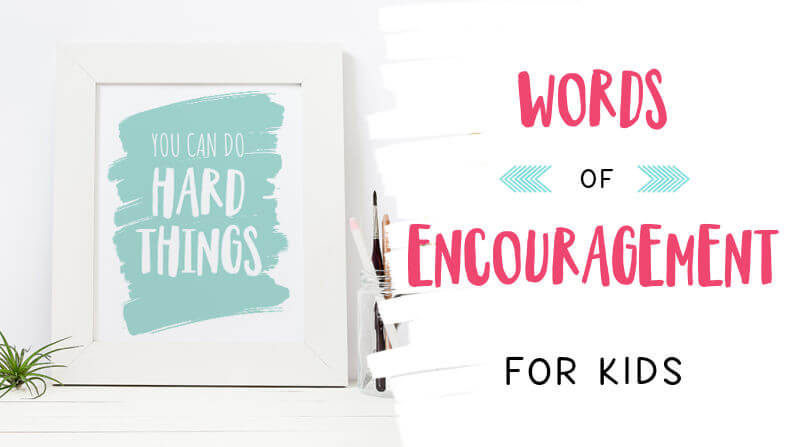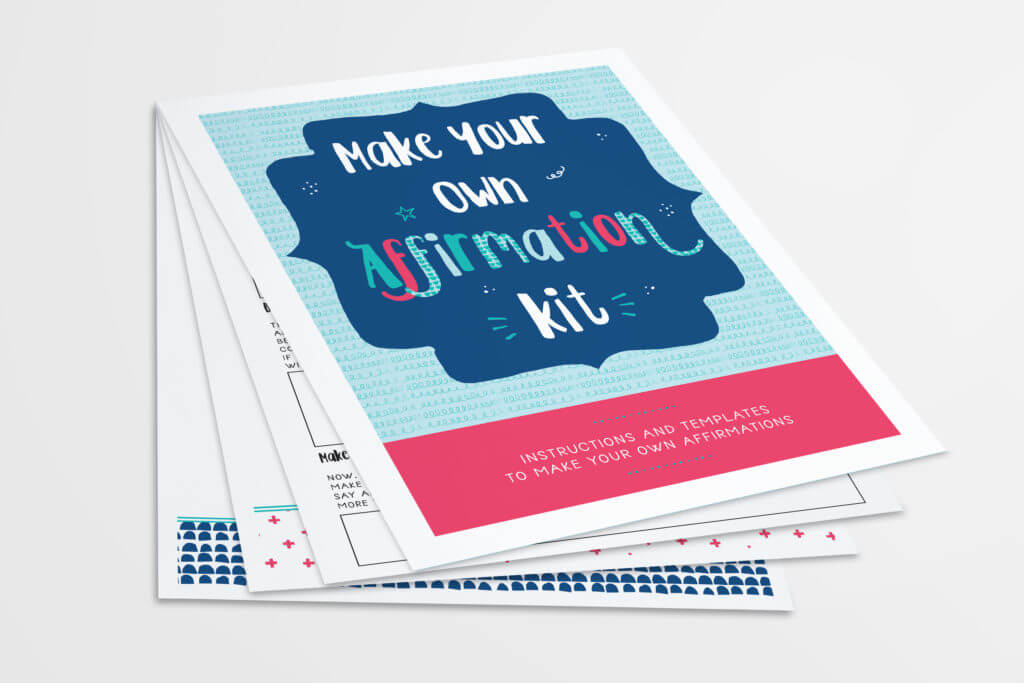Nurturing children with words of encouragement can be a very powerful practice. However, there are some important points to remember before you jump in and lavish your child with encouraging words.
In this article we will cover:
Why Encouraging Words for Children are Important
How to Avoid the Downside of Praising Your Child
When to Use Words of Encouragement
Creative Ways to Incorporate Encouraging Words into Daily Life
40 Encouraging Phrases that Focus on Effort
Why Encouraging Words for Children are Important
If you think back to your childhood and the adults that played a large role in your life, you will start to notice some patterns. The adults who took the time to really see your strengths and encourage you to be your best shaped the way you thought about yourself. You may even have notes or a specific memory of some words of encouragement that you still hold dear, to this day.
On the flip side, there were probably also some negativity in your life as a child. It may have been a bully at school, your sibling, a parent, or a teacher who was full of criticism, teasing, or hurtful words. The words that were spoken to you by these people have also stayed with you and shaped how you view yourself.
Words are very powerful. Especially for children who are still formulating their view of themselves and where they fit into the world. There has been a lot of research done on the effects of criticism and negative words on children. In fact, it has been scientifically shown that in order for children to develop a positive view of themselves, they need at least 5 positive interactions for every 1 negative interaction.
So, for every time that you say something seemingly harmless to your child such as, “you never pick your socks up! Can you please go put them away?” Or, “Hmm, why did you only get a 70 on your math test?” If you want your child to be able to receive your criticism without turning it in on themselves, you need to counteract these criticisms with FIVE positive statements.
The 5 to 1 Ratio of Positive vs. Negative Words
At first glance, this ratio can feel somewhat daunting. If you start noticing your words and interactions and counting how many positive interactions you have versus how many negative interactions, you will probably find that you are not hitting that ideal mark.
The good news is that there are many ways to start increasing the amount of encouraging words you speak to your child. And, it is never too late to start turning negativity into positive reinforcement.
As an added benefit, studies in behavioral and special education classrooms have also shown that using this 5 to 1 ratio with children results in kids being more compliant and having less negative “acting out” behaviors.

How to Avoid the Downside of Praising Your Child
Now, before we jump in with all of the fun and simple tricks you can use to help you get to the ideal amount of encouraging words, let’s look at some common concerns about praising children.
If I Use a Lot of Words of Encouragement, Will My Child Become Spoiled?
Worrying that praising your child will affect them negatively is a common concern. In fact, praise that is focused on performance can actually have many negative outcomes. For example, studies have shown that praising children with labels such as “smart” or “talented” can actually make children more likely to give up easily, less likely to take risks, and more vulnerable to failure.
On the flip side, focusing your encouraging words on your child’s effort, and being specific, can help children learn to keep trying. These types of encouraging words help kids learn to not be devastated or defined by failure.
If this distinction between effort and performance feels difficult to understand, you are not alone. Our culture is very focused on performance style praise. For example, we are used to hearing things like, “good job on that test, you’re so smart!” or “you scored so many baskets in your game today, I was so proud of you!” or even things like, “you are so pretty!”
One trick that has helped me to turn away from this kind of performance-based praise is to try to look at what was the effort behind the performance – and then praise that. So for example,
Instead of:
Good Job on that Test, You’re So Smart
Say:
Wow, you must have studied hard to get this grade. How does this make you feel?
Instead of:
You scored so many baskets in your game today, I was so proud of you
Say:
I can tell you have been really paying attention to your coach and showing up for your team during games.
Instead of:
You’re so pretty (or smart, or good, or other generic word)
Say:
I love how you take such good care of yourself (get specific!)
If you are still struggling with this switch, make sure to scroll down to see a list of 40 different ideas for effort based words of encouragement for children.
When to Use Words of Encouragement for Children
There is pretty much never a wrong time to use good words of encouragement for children. That being said, using encouraging words strategically can help them have an even greater impact!
Praising Kids At Home
One of my favorite things to praise at home is extra effort or responsibility. For example, if my child has wiped up some spilled milk, that is the perfect time to praise their responsibility. I say something like, “Wow honey, I noticed you cleaned up after yourself. That really makes things so much easier for me. Thank You.”
Another great place to encourage kids is to notice and praise behavior that you want to see more of. For example, if your kids are struggling to get along, when you see them playing nicely together, make sure you encourage them. I say something like, “Hey guys, it’s so great to see you both getting along so well. I bet your both enjoying this time too!”
It is also important to use more words of encouragement anytime your kids are struggling. Whether they are having a hard time at school or in the middle of a falling out with a friend, your words can really help them manage these tough times. As mentioned above, kids need 5 positive interactions to counteract each negative one. Even if the negative words are coming from a mean kid or from their own self-talk, your positive words can be the 5 that neutralize those negative ones.
Praising Kids in Public
Another great place to focus your encouraging words is when you are around other people. Noticing your child’s effort when you are distracted by grocery shopping or having coffee with a friend can have even more weight than normal. Plus, allowing others to hear your positive words can make words feel more true.
Creative Ways to Incorporate Encouraging Words into Daily Life
One problem that can often happen when you start to incorporate words of encouragement is that you get busy and forget. Because of this, I love making sure to bring in these moments in unexpected ways each day. (In addition to the normal conversational words of encouragement I also use.)
Using Lunchbox Notes

Lunchbox Notes are a great place to include a little encouraging word. Handwritten and specific is always best, but if you are short on time, even a pre-printed lunchbox note can have a positive impact on a child’s day.
Many pre-packaged lunchbox cards focus too much on performance or don’t really encourage kids. I found this set of affirmation lunch box cards that have some really good sayings. Not all of them are encouraging words, but most are!
Creating a Daily Word of Encouragement
Another trick that I use is that each morning I choose one word or phrase that I want to focus on for each child that day. Having this pre-planned thought helps me to start off right away with some encouraging words. I also find that making this part of my morning routine helps remind me of my goal of getting as many words of encouragement in throughout the day as possible.
Sometimes I will choose the phrase based off of what I know is going on in my kiddo’s life/day. Other times, I will just pick something off of a list (like the list below) and find ways to incorporate that positivity into my kids day.
Using Posters, Bracelets, or other Physical Representations
Another interesting way to counteract some of that negative self-talk that everyone has is to incorporate encouraging a little more subtly. Having a poster in your child’s bedroom that encourages them, or a small note on their bathroom mirror can be really meaningful. I created a Positive Affirmations Kit that I have used with my boys. This project was a lot of fun because we were able to come up with those positive affirmations together and really target areas where they needed some encouragement. Their bathroom mirror currently has a few different mini-posters up!
I also like using bracelets and necklaces as a reminder for my kids to think encouraging words to themselves. Here are some examples of products that you can use with kids to subtly bring in those words of encouragement.
Words of Encouragement that Focus on Effort over Performance
- I see how hard you are trying, keep it up!
- Wow, that was so brave of you to…
- I love how you used your (creativity, knowledge, resources, etc.) to solve that problem
- You must be so happy about your accomplishment!
- Thank you so much for sharing this with me!
- Wow, I can tell how hard you worked on this.
- You’ve kept at this for a long time even though it has been hard. I am so impressed with your determination.
- We have so much fun spending time together.
- When I’m with you I feel really (loved, respected, listened to, etc.), Thank You!
- I can tell that you have taken a lot of pride in your work by how much effort you have put in.
- Wow, that must have taken so much patience.
- You are so resourceful.
- I see how you are (interacting with others, organizing your friends/team, working in your group, etc.) and really showing a lot of leadership.
- You must feel really proud of yourself for…
- It is really impressive how you don’t give up, even when you fail.
- You have so many great ideas!
- It was really hard to (solve this math problem, finish your chore, resolve that argument, etc.) but you kept trying!
- You put a lot of thought into making the right choice for you.
- I love how you are so adventurous.
- I like that you are always willing to try new things. You are really brave!
- You show so much strength and courage when you ask for help.
- Look at how you have improved! Your (effort, determination, etc.) is really mind-blowing!
- Good thinking!
- You ask such (insightful, thoughtful, smart, etc.) questions.
- That was a very kind thing to do.
- You are really good at listening to your friends.
- Not only did you get this done, but you made it look effortless when I know it wasn’t. I am impressed with your natural ability at problem solving!
- You are really extraordinary at choosing how you want to react to things you don’t like.
- I really appreciate how you are able to focus on the positive in hard situations.
- I really appreciate how you are able to be vulnerable and talk about how you are feeling.
- I’ve noticed how much people around you really appreciate your (friendliness, kindness, humor, etc.)
- All of that (soccer, gymnastics, math, etc.) practice sure has paid off!
- I know you can handle it.
- I can tell you really paid attention to all of the details so that you could complete this correctly.
- Remember when you were first learning to do that? And now you can do it all by yourself!
- You admitted you didn’t understand. That’s not always easy to do.
- I love how when your Plan A didn’t work, you came up with a Plan B!
- Congratulations, you really listened to your coach and helped your team out today.
- Wow! How did you do that?
- You are an amazing listener.






